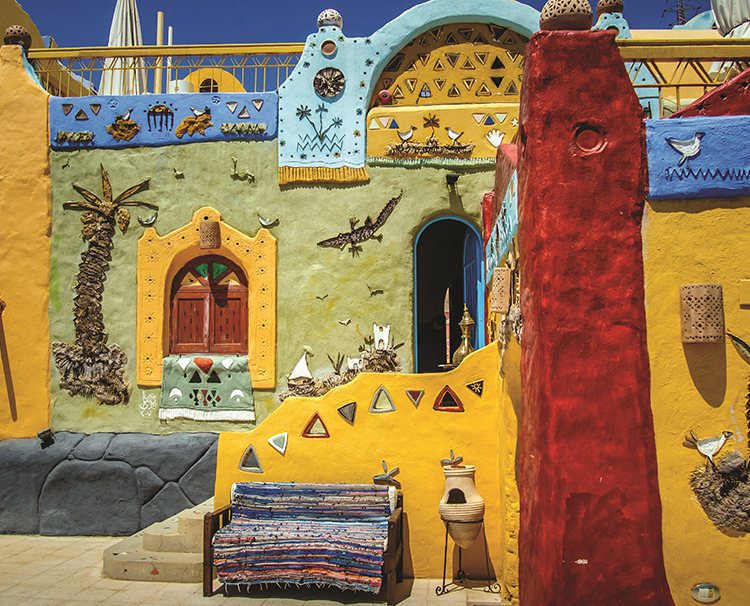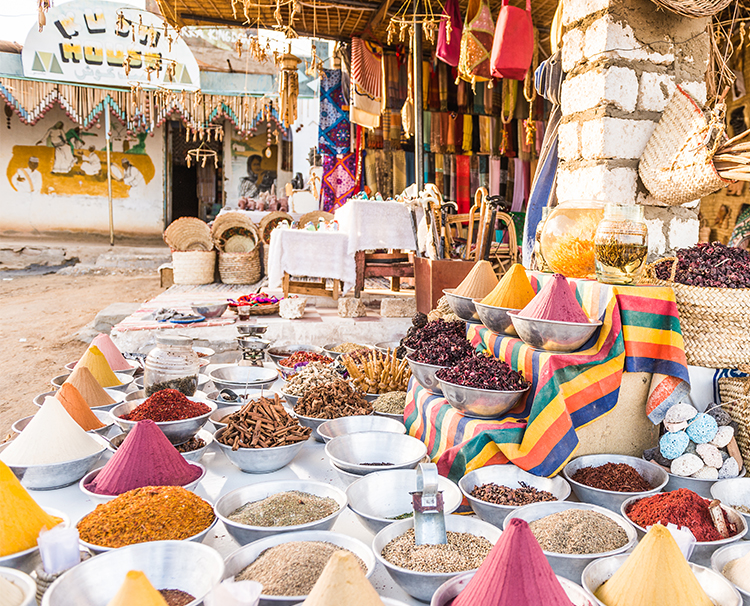
Beyond the “Pearl of Egypt” that is Philae Temple and past the yellow and blue homes of Heisa Island lies the shadow of an ancient civilization that has survived in the hearts of the Nubian people and their unique village communities for over 7,000 years. Nubian villages are not solely comprised of clay mud buildings decorated in vibrant colors – their foundation rests on the indigenous people who call these destinations home as well as their rich heritage.
One of the most unforgettable parts of our 11-night Secrets of Egypt & the Nile river cruise and land journeys is our visit to a special Nubian village that is exclusively toured by AmaWaterways. Find out why exploring this village and meeting the people who live there are some of our past guests’ favorite memories.
History of Nubia
Home to some of Africa’s earliest kingdoms, Nubia (originally known as “Kush”) facilitated a great exchange of ideas, information, and goods. Founded around 5000 BCE and located along the Nile River in what is now Sudan and southern Egypt, the ancient civilization was known for its pottery-making prowess. At first comprised of herdsmen and hunters, Nubians slowly transitioned into fishermen and farmers.

Along the river, Nubians grew bountiful harvests of grains, peas, lentils, and dates. Deeper in the desert, they mined carnelian, gold, and other resources, which they traded with their Egyptian neighbors to the north and along the trade routes that converged in their kingdoms. The people in this region thrived, attracting more settlers from the south. A melting pot of African communities, Nubia developed a sophisticated culture that paved the way for innovation and progress throughout the area.
Nubia Through the Ages
Around 1500 BCE, the Egyptians conquered Nubia and established the province of Wawat. However, the Nubians eventually regained their independence and formed the Kingdom of Napata in the 8th century BCE. The Napatan kings, known as the "Black Pharaohs," ruled over Egypt as the 25th Dynasty.
Later, the Nubians established the Kingdom of Meroe in the 4th century BCE. Meroe became a major center of trade and iron production, and its rulers adopted many Egyptian traditions. The Nubians developed their own writing system known as the Meroitic script. They also constructed impressive pyramids as burial sites for their rulers.
In the 15th century, Nubia faced numerous invasions from various forces, including the Mamluks from Egypt and the Ottomans. These invasions disrupted the Nubian kingdoms, and by the 16th century, much of Nubia had fallen under Ottoman control.
During the 19th century, Nubia became a contested region between the British and the Egyptians. The construction of the Aswan Low Dam and the Aswan High Dam in the 20th century caused significant changes to the region, leading to the displacement of many Nubians due to flooding.

Present Day
In recent times, Nubian communities have faced challenges in preserving their cultural heritage and reclaiming their ancestral lands. There have been efforts to protect Nubian language, traditions, and archaeological sites, as well as to address issues of land rights and cultural identity.
Nubians continue to contribute to the cultural diversity of Sudan and Egypt. They maintain their distinct customs, language, music, and traditional crafts, which you can enjoy first-hand while on Heisa Island.
The practice of handcrafting Nubian pottery still continues to this day. Renowned for their unique shapes, patterns, and colors, the earthenware pots, plates, and jars are painted with vibrant motifs, reflecting the complexity and depth of the culture influencing their designs. Nubians are also commended for their skills in the art of basket weaving. Using natural materials such as palm fronds and reeds, they weave intricate patterns and designs into baskets, mats, and other beautiful decorative items.
Nubian music is characterized by lively rhythms, energetic dances, and soulful melodies. Traditional instruments like the tambour (a small drum), the kissar (a lyre-like string instrument), and the arghul (a double-pipe flute) are commonly used in their musical performances. One music genre that is popular among the people of this region is taarab, a style that blends Western and traditional instruments together with Arabic, Swahili, and Indian influences – all accompanied by poetic lyrics.
Nubians also have a long tradition of choral singing, blending their harmonious voices to create a mesmerizing atmosphere that can commonly be found at weddings, religious ceremonies, and cultural festivals. During your time on the island, immerse yourself in the Nubian people’s beautiful melodies as they present a unique performance of song and dance for you and your fellow cruisers.
Nubian cultural festivals and celebrations are also observed, promoting Nubian heritage and fostering a sense of community and identity among their communities – something that they have continued to preserve despite their displacement.
During your time in Aswan on our Secrets of Egypt & the Nile river cruise and land journey, you can enjoy an incredible opportunity to explore a beautiful Nubian village on Heisa Island and meet the wonderful people who live there – a destination experience only available for AmaWaterways’ guests.
Named after King Hess of Ancient Egypt’s seventh dynasty, the island of Heisa was a burial ground for priests who worked on the island and in the nearby Philae Temple. This island had also been a natural supplier of wood and stones, which were used in the construction of the mysterious Saqqara pyramids.
Step into the village on Heisa Island and take in the vivid colors that adorn the buildings, creating a picturesque scene around you. Set apart from the hustle and bustle of modern society, Heisa invites you to embrace the Nubian customs as the villagers dance, sing, and share their merriment with those blessed to experience their home. Open your mind to a life-changing experience as you learn more about the Nubian people’s history, culture, and heart.
Contact your travel advisor to learn more about how you can immerse yourself in this incredible culture and heritage on our Secrets of Egypt & the Nile river cruise and land journey. If you are interested in delving deeper into the African Diaspora of this region, join us on our specially curated Soulful Experience Secrets of Egypt & the Nile itinerary, departing May 14, 2025.